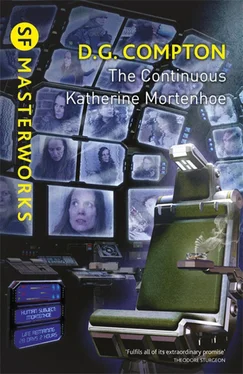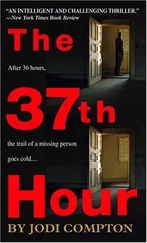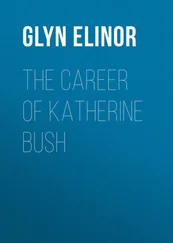Vincent rubbed his hands. ‘Now I’d like you to meet your series director. Roddie’s something really rather special. He’s not like me: he’s got the makings of a conscience.’
‘Couldn’t it wait?’ She had a lot to do, and not long in which to do it. ‘Last night is catching up on me. And officially I’ve got another day of my Private Grief left.’
‘Only a social meeting, Katherine. I think you’ll feel better once you’ve met him. And there’s something he’s got to explain. Something we’ve had up our sleeve just waiting for someone like you.’
He reached for the telephone. ‘Besides, you slept in the hospital till nearly one, so you can’t be feeling all that tired.’
He knew altogether too much about her. He and Dr Mason must have a hot line. She considered doing a Gordon’s Syndrome on him just to be awkward, but it seemed a sort of sin… Her series director, he had said. It was a nice thought: dying really did need a series director. But this Roddie was a luxury she’d just have to do without.
After a great deal of telephoning — a circumspect call to Gerald for example, to her first husband (she might have known they’d be on to him) — Vincent finally traced her series director to some official-sounding place over on the far side of the city. His questions became even more circumspect, and he made notes of the answers secretively, smiling at her, charming her as he did so. Afterward he told her — very lightly — that Roddie was tied up on some official matter and mightn’t be available until the following day. She wasn’t curious, merely relieved. The following day was a problem to be solved as it happened.
She promised to deliver herself up to the protection of NTV at four the next afternoon, and got away as quickly as she could. She gained the impression that Vincent Ferriman suddenly had other things on his mind, and wasn’t altogether sorry to see her go.
From NTV House she took a taxi, first to her bank and then on as far into the old dock area as the driver would go. Then she walked. She had seen the sort of shop she was looking for in a color magazine some fourteen months before. Fringies had been news in those days. Where she was going there’d be plenty of them.
The road she walked along was a huge trackway slashed across a mass of flashy last-generation housing and some little back-to-backs even older, its surface cracked and tufted with stringy grass. The article had said much of this housing was occupied, but she saw no signs of life and heard none. Above the road shredded decorations were strung between the huge tilted lamp standards: faces peeled from house-high posters, egg crates, a thousand plastic bottles, alloy balustrading, coils of brown and blue electric cable, silver foil pie plates, a string of enormous yellow wristwatches from some advertising campaign. Instant art. They twirled and chattered above her in the cool, bright air. On either side of them the chopped-off ends of the houses were dazzle-painted, and lettered with last year’s slogans.
Ahead of her she saw the trackway partially blocked with a thirty-foot-high replica of an old-fashioned cash register made from rusty boiler plating. As she skirted it she realized it had once been used as a defensive position, with firing slits and a blast-shielded entrance. At the top of it someone had rung up an undergraduate No Sale. She reminded herself that once she too had been an undergraduate.
The trackway ended abruptly at a vast jumble of derelict trucks piled in front of the entrance to the old Container Depot. There seemed to be no way around. Children were playing in the trucks. When they saw Katherine approach doors slammed and they were suddenly very quiet. A tin can clattered onto the road in front of her and rolled a few feet. She stopped walking.
‘Please may I come in?’ she called.
There was a pause, and then a cheerful chorus of shouts and a few more tin cans. She noticed that none of them fell particularly near.
‘See you next Tuesday,’ the children chanted. ‘See you next Tuesday.’
Katherine waited for a gap. ‘Tuesday’s a long way off. Mayn’t I come in today?’
There were shrieks of laughter. One of the truck doors opened and a boy of fourteen or so climbed down a stairway of battered radiator grilles. He came toward her, then stopped a few yards away. His head was shaved like that of a Sioux.
‘It’s a dirty insult,’ he said, his voice surprisingly pleasant. ‘See you next Tuesday — it’s a dirty insult. The initials make a dirty insult.’
Katherine worked it out. ‘I don’t think that’s an insult.’ He was almost as tall as she was. ‘Most men love cunts best of all. So how’s that an insult?’
‘It just is.’
‘All right — see you next Tuesday too, then. With knobs on. Now may I come in?’
He laughed. ‘You don’t know how.’
‘Will you show me please?’
He hesitated. ‘I don’t mind.’
She followed him to the big double doors of a derelict container. Behind them at the far end of the container was a short tunnel through the remaining piled vehicles, and beyond that the vast open truck park of the Depot.
‘We don’t mind you knowing,’ he said. ‘Lots of people know. They still can’t get in if we don’t want them to.’
He ran back to his gang, and they started up their chant again.
Inside the high wall of the Depot her arrival was noticed, but only mildly. On her way across the truck park to the terminal building she passed many groups of Fringe People, talking, or playing a complicated throwing game on the marked-out asphalt or just sitting. They appeared to find their permanent leisure not in the least troublesome. Usually they looked up as she passed, and offered their embarrassingly pious greeting. ‘Care,’ they said, and smiled, and made signs. ‘Care…’ It wasn’t as if they were all of them young — you expected piety in the young. Many of them were as old as she, or older. But at least the media hadn’t penetrated their rarefied lives, so that her presence, the PG sticker on her lapel, gave them no salacious thrill.
Overhead thousands of sea gulls screamed and circled.
They were a new breed, pi-dogs, scavengers of the new society. If you’d offered them a live fish most of them wouldn’t have known what to do with it. In their own way the fringies were equally new.
The Container Terminal had once been a combined railhead, cargo dock, and truck-loading center. Now the vast area under its roof was divided up into streets and little open spaces crowded with stalls like an eastern bazaar. A thousand conflicting musaks helped the illusion. Owing to the lack of rain inside the terminal all sorts of unusual building materials could be used: one ‘house’ Katherine saw was built entirely of white expanded polystyrene blocks that had once contained transistor radios from Sweden. Another, mustier, was made of books, many from Peregrine. The air in the narrow streets was heavy with the smell of joss sticks that didn’t altogether cover other even less desirable scents.
Katherine wandered for some minutes, unable to find the sort of shop she needed. She felt absurdly self-conscious in her city clothes. Nobody questioned her or offered to help, but people watched her go by with an interested openness that she found threatening. They seemed so agreeable to the possibility of communication, and to have so much time for it, that she shrank away. Preserve me from having a rigor now, she thought. They’ll be bound to touch me, intrude, put all their repulsive caring into practice.
Suddenly, mercifully, she came on a whole street of the shops she wanted. Clothing shops for her planned disguise. She stopped at the first, hardly more than a stall, with a candy-striped awning and a stock that to her eye looked like a combination of old rummage and Hong Kong imitations of old rummage. The fat young woman beside it — sitting on a kicked-in guitar loudspeaker — was dressed in the uniform of a New York policeman.
Читать дальше












